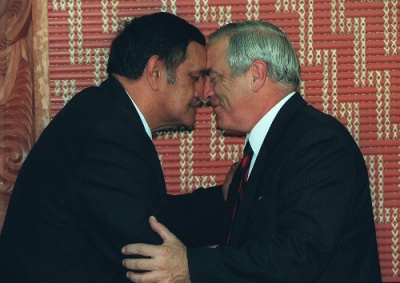Events In History
-
 1 July 1988Bastion Point land returned
1 July 1988Bastion Point land returnedThe government announced that it had agreed to the Waitangi Tribunal's recommendation that Bastion Point on Auckland's Waitematā Harbour be returned to the local iwi, Ngāti Whātua. Read more...
-
 18 March 1983Waitangi Tribunal rules on Motunui claim
18 March 1983Waitangi Tribunal rules on Motunui claimIn a landmark ruling, the Waitangi Tribunal found that the Crown’s obligations under the Treaty of Waitangi included a duty to protect Māori fishing grounds. Read more...
-
 5 January 1977Occupation of Bastion Point begins
5 January 1977Occupation of Bastion Point beginsJoe Hawke led an occupation of Takaparawhā (Bastion Point reserve), Auckland, to protest against the Crown's decision to sell land that Ngāti Whātua maintained had been wrongly taken from them. Read more...
-
 10 October 1975Waitangi Tribunal created
10 October 1975Waitangi Tribunal createdThe Waitangi Tribunal was established to provide 'for the observance and confirmation of the principles' of the Treaty. It initially investigated claims dating from the passage of the Treaty of Waitangi Act, but in 1985 its jurisdiction was extended back to 1840. Read more...
Articles
The Treaty in brief

The Treaty of Waitangi is New Zealand’s founding document. It takes its name from the place in the Bay of Islands where it was first signed, on 6 February 1840. The Treaty is an agreement, in Māori and English, that was made between the British Crown and about 540 Māori rangatira (chiefs).
-
Page 2 – Treaty FAQs

Answers to some common questions about the Treaty of Waitangi.
Waitangi Day

Every year on 6 February, New Zealand marks the signing of the Treaty of Waitangi in 1840. For most people, Waitangi Day is a holiday; for many, and especially for Māori, it is a time for reflecting on the Treaty and its place in modern New Zealand.
- Page 5 - Waitangi Day 1970sWaitangi Day, a public holiday from 1974, briefly became New Zealand Day in the 1970s. Increasingly, it became a focus for Māori protest
Treaty timeline

See some of the key events between 1800 and 1849 relating to the Treaty of Waitangi.
- Page 4 - Treaty events since 1950Learn about some of the key events from 1950 onwards relating to the Treaty of
The Treaty in practice

Amalgamating Māori into colonial settler society was a key part of British policy in New Zealand after 1840. Economic and social change, along with land-purchase programmes, were central to this process.
- Page 6 - The Treaty debatedModern New Zealand has debated the Treaty of Waitangi as never before. Understanding, reconciliation, protest and confrontation have been part of this
Māori Language Week

Every year since 1975 New Zealand has marked Māori Language Week - Te Wiki o Te Reo Māori. This is a time to celebrate te reo Māori (the Māori language) and to use more Māori phrases in everyday life. In 2016 Māori Language Week runs from 4-10 July, the theme is ākina to reo – behind you all the way which is about using te reo Māori to support people, to inspire and to cheer on.
- Page 6 - Waitangi Tribunal claimThe Waitangi Tribunal claim for te reo
Biographies
-
 Rata, Matiu
Rata, Matiu
As minister of Māori affairs Matiu Rata helped set up the Waitangi Tribunal in 1975. He later left the Labour Party to form Mana Motuhake, the first modern Māori politcal party.
Read more... -
 Kirk, Norman Eric
Kirk, Norman Eric
In 1972 Norman Kirk broke National’s 12-year-long grip on the Treasury benches and became Labour’s first New Zealand-born PM.
Read more...
Related keywords
- taranaki
- conservation
- treaty of waitangi
- waitangi day
- roadside stories
- bastion point
- ngati whatua
- maori
- land claims
- protest
- michael joseph savage
- treaty claims
- ngati kuri
- matiu rata
- maori leaders
- te reo māori
- norman kirk
- MPs
- prime ministers
- labour party
- springboks
- nuclear free
- national identity
- ngai tahu
- douglas graham
- parliament
- public holidays
- new zealand day
- race relations
- 1970s
- whina cooper
- urbanisation
- nga tamatoa
- maori land
- hikoi
- maori language
- sesquicentenary
- timeline
- declaration of independence
- james busby
- government
- william hobson
- waitangi
-
Main image: Ngai Tahu treaty settlement, 1997
Charles Crofts (Negotiator for Ngāi Tahu) and Doug Graham (Minister in Charge of Treaty of Waitangi negotiations) hongi after signing the Ngāi Tahu settlement, 24 September 1997




